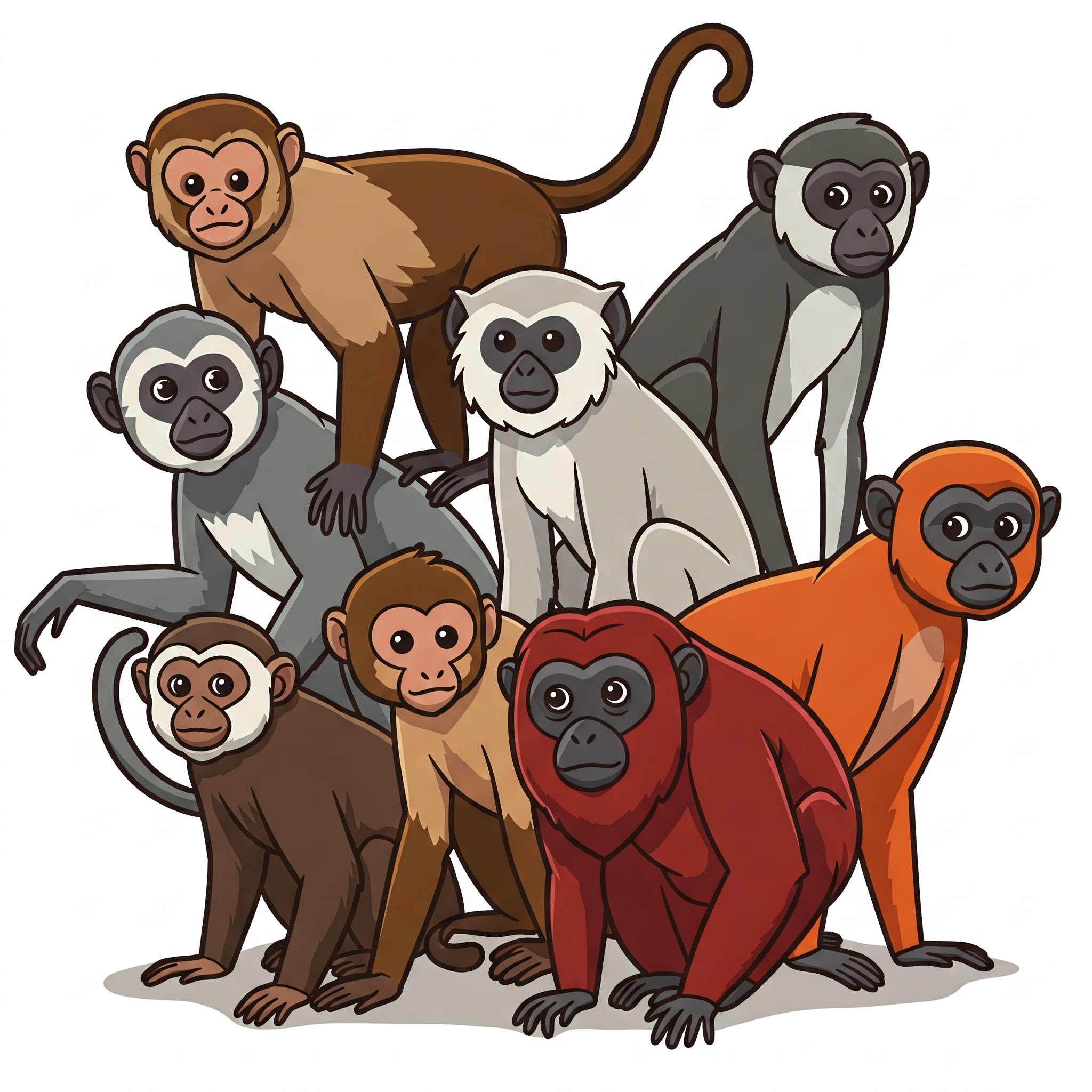Monkey
Definition
Monkey is a noun that refers to a nonhuman primate, typically excluding apes, characterized by a long tail and often arboreal habits. The term can also be used as a verb to describe playful or mischievous behavior.
Parts of Speech
- Noun
- Verb
Pronunciation
American English
- IPA Pronunciation: /ˈmʌŋ.ki/
- Respelling: MUN-kee
British English
- IPA Pronunciation: /ˈmʌŋ.ki/
- Respelling: MUN-kee
Etymology
The word "monkey" originates from Middle Low German "monneke," a diminutive form of "Monk." It likely became popular through medieval fables and folklore, symbolizing clever or mischievous animals.
Derivatives
- Monkeying (verb)
- Monkeyshines (noun, informal)
- Monkeyish (adjective)
- Monkeypox (noun)
- Monkey bars (noun)
Synonyms
- Primate
- Simian
- Mischief-maker
Antonyms
- None
Usage
The term "monkey" is widely used to refer to various species of primates or to describe playful and mischievous behavior. For example, "The monkey swung from branch to branch," or "The children were monkeying around in the yard."
Related Terms
- Primate: A mammal of the order including monkeys, apes, and humans.
- Ape: A primate without a tail, often larger than monkeys.
- Arboreal: Living in trees, a characteristic of many monkeys.
Detailed Definitions
Noun
- A nonhuman primate, excluding apes: Often characterized by long tails and arboreal behavior.
- Example: "The zoo has a variety of monkeys in their primate exhibit."
- A playful or mischievous person: Informal use to describe someone behaving like a monkey.
- Example: "Stop being such a monkey and sit down!"
Verb
- To play or tamper with something: Engage in mischievous or playful activities.
- Example: "Don’t monkey around with the equipment—it’s fragile."
monkey



🇨🇳 Mandarin (Simplified Chinese)
- 猴子 (hóuzi)
- IPA Pronunciation: /xǒʊ̯ tsɹ̩/
- Respelling: (hoe-tzuh)
🇮🇳 Hindi
- बंदर (Bandar)
- IPA Pronunciation: /bʌnd̪ər/
- Respelling: (bun-dur)
🇪🇸 Spanish
- Mono
- IPA Pronunciation: /ˈmono/
- Respelling: (moh-no)
🇫🇷 French
- Singe
- IPA Pronunciation: /sɛ̃ʒ/
- Respelling: (sanj)
🇸🇦 Arabic (Modern Standard Arabic)
- قرد (qird)
- IPA Pronunciation: /qird/
- Respelling: (keerd)
🇧🇩 Bengali
- বাঁদর (Bandôr)
- IPA Pronunciation: /bad̪or/
- Respelling: (baa-dor)
🇷🇺 Russian
- Обезьяна (Obez'yana)
- IPA Pronunciation: /ɐbʲɪˈzʲjanə/
- Respelling: (o-bee-zya-na)
🇵🇹 Portuguese
- Macaco
- IPA Pronunciation: /mɐˈkaku/
- Respelling: (ma-ka-ku)
🇮🇩 Indonesian
- Monyet
- IPA Pronunciation: /monjət/
- Respelling: (mon-yet)
🇩🇪 German
- Affe
- IPA Pronunciation: /ˈafə/
- Respelling: (ah-fuh)
🇯🇵 Japanese
- 猿 (saru)
- IPA Pronunciation: /saɾɯ̥/
- Respelling: (sah-ru)
🇻🇳 Vietnamese
- Khỉ
- IPA Pronunciation: /kʰi˧˩/
- Respelling: (khee)
🇰🇷 Korean
- 원숭이 (wonsungi)
- IPA Pronunciation: /wʌn.s͈u.ŋi/
- Respelling: (won-soong-ee)
🇹🇷 Turkish
- Maymun
- IPA Pronunciation: /majmun/
- Respelling: (mah-y-mun)
🇵🇰 Urdu
- بندر (Bandar)
- IPA Pronunciation: /bʌnd̪ər/
- Respelling: (bun-dur)





